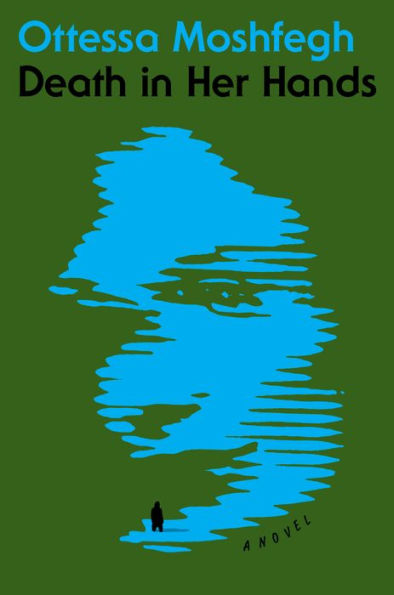Ottessa Moshfegh’s mother was born in Croatia and her father was born in Iran, but she was born in the United States, giving her certain rights: “I was born in Newton, MA and I have lived my whole life in the United States, so by being an American I feel that I have the authority and experience growing up here to write about American culture well enough to satirize it” — and she does it adroitly in 2018’s My Year of Rest and Relaxation, a comedic tale in which she mocks trust fund babies who are alienated in pre-911 New York City. The theme of isolation is also at the epicenter of Eileen, Moshfegh’s breakout noir, and it is the major theme of her new novel Death in Her Hands. In all three of her books, an eccentric female lead directs the action, and in all three creations Moshfegh writes drolly about issues some authors stay away from – patricide in Eileen and sexual assault in My Year of Rest and Relaxation.
 Before I get to Death in Her Hands, here is a Cook’s tour of her two other novels. In Eileen, Moshfegh sets the action in Maine, casting an ominous mood required for any noir. Themes of resentment, self-hate, and death are strewn throughout the novel. The protagonist leaves college to tend to her sick mother and live with her alcoholic father, causing Eileen to abhor him and to commit a crime only Moshfegh can conjure up. The author creates a despicable character whom the reader, somehow, sympathizes with – Moshfegh’s specialty.
Before I get to Death in Her Hands, here is a Cook’s tour of her two other novels. In Eileen, Moshfegh sets the action in Maine, casting an ominous mood required for any noir. Themes of resentment, self-hate, and death are strewn throughout the novel. The protagonist leaves college to tend to her sick mother and live with her alcoholic father, causing Eileen to abhor him and to commit a crime only Moshfegh can conjure up. The author creates a despicable character whom the reader, somehow, sympathizes with – Moshfegh’s specialty.
In My Year of Rest and Relaxation, Moshfegh captures the zeitgeist of Y2K New York City where the spoiled-brat female narrator, living off the inheritance of her deceased parents, sleeps away a year of her life with the help of steady narcotic diet: “I took Solfoton and a bottle of Robitussin one day, Nembutal and Zyprexa the next.” The unreliable and unnamed narrator, a recent Columbia University grad, alienates herself by living in a drug-induced haze observing the New York’s privileged: “I’d tried being one of those blond women speed walking up and down the Esplanade in spandex, Bluetooth in my ear like some self-important asshole …” She nails it. I know: I was raised on New York’s Long Island and lived in New York City for several years. Readers who are not from New York must trust Moshfegh’s observations and commentary that some New York City denizens are pretentious and the city can be the loneliest place in the world.
In Death in Her Hands, Moshfegh’s prose is more subtle. The starring role goes to another one of Moshfegh’s unreliable but engrossing narrators, Vesta Gul (Gullible?), a lonely, 72-year old widow who has moved east to live in a cabin in the woods near a town called Levant. There, she finds a note near a dead body: “Her name was Magda. Nobody will ever know who killed her. It wasn’t me. Here is her dead body.” So begins Gul’s journey, full of twists and turns, to find the killer, The author creates a pitch-perfect penumbral effect, calmly reeling in the reader. There are signature Moshfegh phrases: “She [Magda] saved a little from that bucket and used it to give that wicked Shirley some pee in her special nonfat milk. Or she dipped Shirley’s toothbrush in the pee. A flake of excrement nestled between the bristles.” In addition, she traverses the landscape of New England (or so I presume), introducing archetypes and tertiary characters:
“Bethsmane was ugly. There were ‘For Sale’ signs on every other truck and mobile home. It seemed preposterous that someone would choose to live in such a place, inhabit one of the cheap aluminum-sided factory houses … I had come to recognize on my trips to Bethsmane: heavy women, big as cows, whose thick ankles seemed about to snap as they tottered up and down the aisles with their huge shopping carts filled with junk food.”
 Moshfegh’s metafictional deviltry develops through Vesta’s shoe leather reporting. Having speculated about the presumed murder, she begins to create her own story, and devises a past life for Magda along the way. Is the widow losing her mind, or will Vesta’s imagination actually lead her to solving the mystery? Her own backstory emerges, or at least her version of her marriage to the late Walter. Those bitter ruminations may or may not be delusional. But Vesta’s monologue resonates as a desperate search for meaning. Also, the rhythms of Moshfegh’s sentences are sonically absorbing:
Moshfegh’s metafictional deviltry develops through Vesta’s shoe leather reporting. Having speculated about the presumed murder, she begins to create her own story, and devises a past life for Magda along the way. Is the widow losing her mind, or will Vesta’s imagination actually lead her to solving the mystery? Her own backstory emerges, or at least her version of her marriage to the late Walter. Those bitter ruminations may or may not be delusional. But Vesta’s monologue resonates as a desperate search for meaning. Also, the rhythms of Moshfegh’s sentences are sonically absorbing:
“I never heard of any criminal activity. I’d been in Levant a whole year, and the worst thing I’d seen happen was a single car crash. A driver hit a tree on Route 17. I’d driven past the tow truck hitching up the wreck. But that was all. I hadn’t liked those policemen, their flabby, parched faces, eyeing my home, my private space, with guns in their belts, badges gleaming, strutting around the acreage like they owned the place.”
Vesta’s lonely narrative appeals to us for companionability — but the longer we stick with her, the more we must consider the possibility that if she is just making things up, then we are accomplices to the wobbly if persistent construction of her internal dialogue. Still, there is the quest for the murderer, an enticement to follow along.
[Published by Penguin Press on June 23, 2020, 272 pages, $27.00 hardcover]